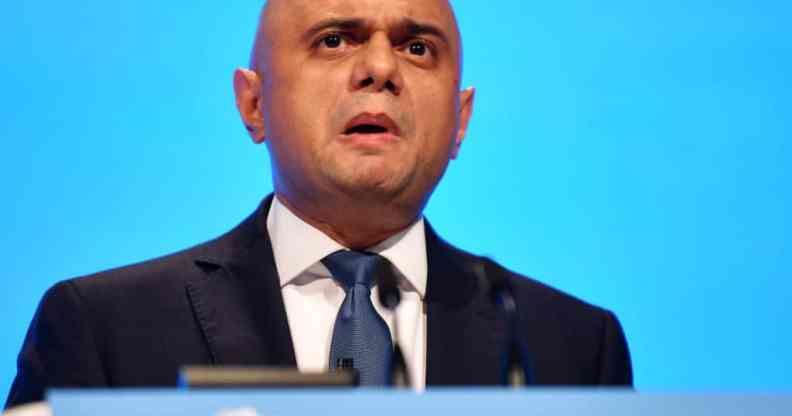Major party LGBT+ groups unite to demand Tories keep promise and finally end HIV epidemic

Sajid Javid speaks on day two of the 2019 Conservative Party Conference at Manchester Central on September 30, 2019. (Jeff J Mitchell/Getty)
Each of the four major political parties’ LGBT+ groups have called on the government to “step up” to end HIV transmission in the UK by 2030.
LGBT+ Conservatives, LGBT+ Labour, LGBT+ Liberal Democrats and LGBTQIA+ Greens have co-signed a statement urging ministers to “deliver change” in their HIV Action Plan, which is due to be published next week.
In their joint statement, the four LGBT+ political groups note that “huge progress” has been made in the fight against HIV and AIDS in the 40 years since the first cases were detected in the UK.
The work of activists, allies and those living with HIV has made it “scientifically possible to end new transmissions in the UK”, the four political groups note, adding that the UK government has already committed to achieving that goal by 2030 and to cutting new HIV cases by 80 per cent by 2025.
“We all support this pledge but are determined to do all we can so ministers make good on their promises,” the groups write.
“Despite the UK having the tools to prevent new cases of HIV, 80 lives are changed forever every week with an HIV diagnosis. Over half a million people leave a sexual health clinic without being offered a test. People living with HIV still experience abhorrent levels of stigma and discrimination.
“That’s why the UK government’s new HIV Action Plan must deliver change. We are united in our call for this plan to thread equity and ambition throughout the document and be fully funded. Only then can we make a step-change to reaching the 2025 and 2030 goals.”
‘Racially minoritised LGBT+ people’ face significant barriers in accessing services
The groups note that LGBT+ people continue to “shoulder some of the highest rates of new HIV diagnoses” while also facing “significant inequalities in access to healthcare”. The challenges are even greater for “racially minoritised LGBT+ people” who face significant barriers in accessing HIV prevention services.
“Rooting out these inequalities is fundamental to ensuring everyone can feel progress,” the statement says.
“HIV testing must be normalised and accessible at home in all parts of the country. In areas where there are high rates of HIV, a test should be offered as standard in all A&E departments and GP surgeries.
“We want to see increased action on expanding access to the HIV prevention drug, PrEP, so it can get into the hands of more people who could benefit from its life-changing benefits.
“That means starting with putting PrEP into pharmacies and GP surgeries and making a commitment within the HIV Action Plan to fund a pilot and to urgently start this work.”
The political groups also called on ministers to “step up mental health and overall wellbeing support” for people living with HIV.
“People living with HIV are still twice as likely to experience poor mental health which is often fuelled by stigma and misinformation within society,” the statement says.
“The government must demonstrate leadership in tackling this through greater funding for HIV mental health support and a high profile public awareness campaign to tackle stigmatising attitudes towards HIV.”
Closing out their statement, the four political groups note that the epidemic has “devastated so many LGBT+ lives” over the last four decades.
“As LGBT+ people, we stand on the shoulders of giants in what has been achieved in the fight against HIV. We are united in our determination to see an end to new HIV transmissions in the UK and support people living with HIV.
“Now we urge the UK government to step up and do the same in its new HIV Action Plan by fully funding the fight and taking the decisions required to end new cases of HIV by 2030.”
Terrence Higgins Trust praises LGBT+ groups for showing consensus on HIV transmission
Liam Beattie, public affairs officer at the Terrence Higgins Trust, told PinkNews that it’s “really significant” to see the four biggest political parties’ LGBT+ groups coming together to get the government to “turn the dial on HIV”.
“On this year, which marks 40 years since the first cases of HIV were reported globally, I think that it demonstrates the political unity and consensus that there is among the LGBT+ political groups on this,” Beattie said.
“It’s not often that political parties will show consensus when it comes to policy issues, but I think on this one, there is real strength in numbers. Whilst there might be some disagreements around the specific policy areas, like you would expect from different political parties, I think the fact that we’ve now got broad agreement from those political groups shows real ambition.”
Beattie praised the statement for referencing the issues facing LGBT+ people from racially minoritised communities, saying it’s “so important progress is made for those groups”.
“I’m really pleased about it and I do hope that it’s well received by government ministers.”

